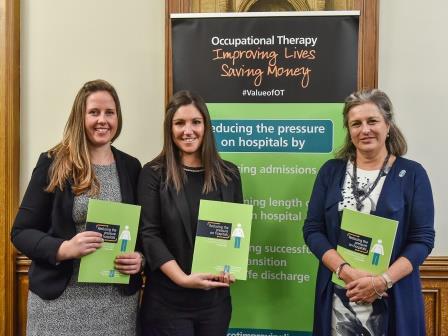Support from occupational therapists (OTs) can ease the pressure on emergency departments, a report which includes data from Barnet Hospital has revealed. 
The report, published by the College of Occupational Therapists (COT), was launched at a reception at Westminster at the end of last year attended by two members of the Royal Free London’s rapid response team, team lead Georgia Harding, and clinical lead for the team Tahlia Levin.
The report, which references work carried out by the Barnet Hospital rapid response therapy team, highlights how occupational therapists can reduce hospital admissions and reduce discharge delays, minimising the time patients spend in hospital unnecessarily and saving valuable NHS resources. The data collected at Barnet Hospital revealed that the rapid response team enabled the discharge 83% of the patients they assessed in the emergency department.
The OTs at Barnet Hospital, who are part of the rapid response therapy team, ensure patients who are medically ready to be discharged have appropriate support in place to allow them to return home safely or to an alternative suitable setting. A similar service is provided by OTs at the Royal Free Hospital emergency department.
Enabling more patients to be discharged safely benefits patients and can ease the pressures on emergency departments, especially during the winter months, when there is an increase in demand for services.
Studies show that patients who are well enough to return home are likely to recover more quickly in their own environment, provided they have appropriate care and support, than if they had stayed longer in hospital. Increasing the number of patients who are discharged also improves patient flow through a hospital which means there is less pressure on emergency departments.
Tahlia said: “Not everyone is aware of the benefits that a team of OTs can bring to an emergency department. If patients don’t require acute medical and nursing care then it is usually in their best interest to return to their own home to familiar surroundings. We ensure those patients have the right access to care and support so they are able to safely return to their home. The COT study shows that OTs can ease the pressures on emergency departments, and should be an integral part of a front end multidisciplinary team.”
Georgia explained how the rapid response team helps patients. “A patient who has broken their arm may not require hospital admission but might not be able to do all the things they would normally do,” she said. “Therapists can facilitate a safe discharge by assessing the patient and arranging the support they need at home, be it carers, equipment or rehabilitation services in the community.
“We assess each patient’s physical and cognitive functional ability, as well as their home environment in order to understand what support they will require to safely return home. We work with local authorities and community services to enable positive patient outcomes and experience.”
Laura Leadsford, director of therapy services at the Royal Free London, added: “We were delighted that our OT service was able to support this report, which shows that OTs can offer an invaluable service to hospitals, especially as we are facing greater pressures than ever.
“Our OTs do a wonderful job supporting patients and helping them return safely to own homes, so we were really proud that the trust was able to help launch this report.”
Ends
Image: L-R Georgia Harding, Tahlia Levin and Julia Scott, the chief executive of the College of Occupational Therapists
Notes to editors
About the Royal Free London NHS Foundation Trust
The Royal Free began as a pioneering organisation and continues to play a leading role in the care of patients. Our mission is to provide world class expertise and local care. In the 21st century, the Royal Free London continues to lead improvements in healthcare.
The Royal Free London attracts patients from across the country and beyond to its specialist services in liver and kidney transplantation, haemophilia, renal care, HIV, infectious diseases, plastic surgery, immunology, Parkinson's disease, vascular surgery, cardiology, amyloidosis and scleroderma and we are a member of the academic health science partnership UCLPartners.
In July 2014 Barnet Hospital and Chase Farm Hospital became part of the Royal Free London. Read 'A bigger trust, a better future'.
 Translate
Translate